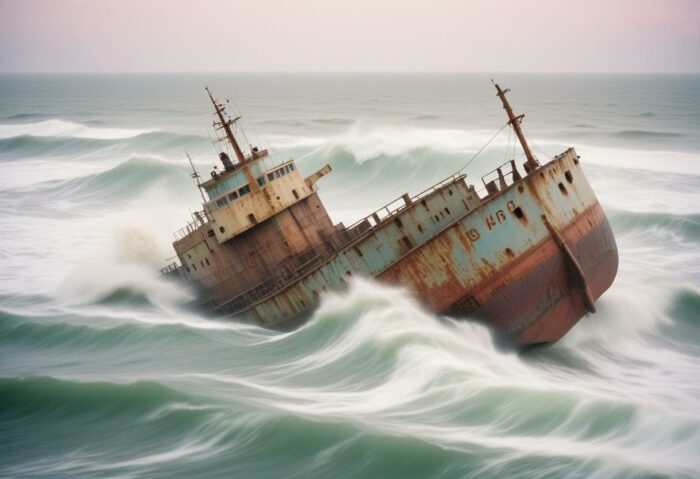Yes, generally, boat insurance covers sinking. However, there are some notable policy exclusions you may need to know. Typically, your boat insurance policy covers sinking if your boat sinks due to a peril that is covered. And your policy might also reimburse you for some removal and salvage costs.

As long as you have a full boat insurance policy or some sort of comprehensive policy, your insurer should cover your boat if it sinks because of a covered damage called peril. Examples of covered perils include vandalism, storms, theft, and vandalism.
Always keep in mind that, if you only have liability coverage, damage to your vessel won’t be covered.
If your policy shows that the operation of your boat is only covered in a certain area, you won’t be covered if your vessel goes under somewhere that is beyond this navigation. Make sure you are aware of your policy’s cruising range.
Also, most policies only cover personal use. If the vessel sinks while you are using it for business or commercial purposes, your insurance may not cover you. These commercial purposes include commercial fishing trips or chartered cruises.
How Does Boat Insurance Covers Sinking?
How much you get for your boat after it sinks depends on your insurer and the policy. When you purchase a boat insurance policy, you choose how much your boat is worth for coverage.
If your boat is declared a total loss, when it sinks, the insurer pays you based on that value.
The best way to insure your boat is usually for its actual cash value. This means the insurer covers your vessel for its market value at the time you purchased it, but the amount they will pay decreases over time as the vessel gets older.
That’s because actual cash value (ACV) accounts for depreciation. The older the boat, the less the market value will be, so the less the insurer pays.
Agreed-upon value doesn’t consider depreciation. You agree on a value with the insurance provider, usually at least what you paid for the boat, and they pay you that amount if your boat sinks, no matter the age.
This coverage is common, but it is usually more expensive than the actual cash value.
For new boats, you might get total replacement cost coverage or guaranteed replacement cost coverage. And this is the most expensive option. This means the insurer will buy you a brand new boat of the same make and model if the one you are using is damaged.
This coverage is only available for boats less than a year or two old. After that, insurance companies usually pay the market price or the agreed-upon value. They don’t want to replace an old boat with a brand new one.
Does My Boat Insurance Cover Hitting a Rock?
As long as you are operating the boat properly and have comprehensive coverage, the policy should cover hitting a rock. If you were driving fast or were intoxicated, the policy may exclude the damage.
Hitting a rock or other debris could cause huge damage to your watercraft. If it sinks because of the accident, you will need to deal with some removal and salvage costs. Your policy may have a couple of ways to help you deal with added costs.
Some policies may have wreckage, removal, and salvage costs included that won’t impact the payout of your boat.
In some cases, your insurer may write you a check for your boat value but require that a percentage go to salvage and wreckage removal.
Read your policy very well and understand it. When dealing with the removal of the sunken boat, you don’t want to reduce your reimbursement.
What Should I Do After My Boat Sinks?
After your boat sinks and you ensure that everyone is safe, you should contact your insurer as soon as possible. The longer you wait, the more damage there will be.
It is advisable that you provide your insurer with as much information as possible for a smooth claim process. You may have to meet with an adjuster too.
Your vessel may be considered a total loss if the cost to get it repaired is more than it’s worth.
After it sinks, your insurer will determine if it is a total loss or not. This is the point where the coverage you chose comes to the scene (agreed-upon value, actual cash value, or replacement value).
If it is declared a total loss, you can be paid up to the policy’s limits for your boat value. If the insurer deems the vessel repairable and salvageable, your insurer would help cover the costs of fixing it up.
Depending on the location where your boat was submerged, the local authorities may ask that the wreckage be removed as soon as possible. So it is advisable not to hesitate and call your insurer.
Sunken Boat Recovery costs
The cost of recovering a sunken boat depends on your vessel’s length. However, it is likely to cost about a few thousand dollars at least. If you have the perfect boat coverage, your insurer can cover all or some of your recovery costs for you.
Refloating, salvaging, and towing can cost hundreds of dollars per boat-length foot. Having the right policy that can cover all expenses without cutting the value of the boat itself is the perfect decision.
A comprehensive boat policy is the perfect way to protect your watercraft from damage. However, with just liability coverage, many policies cover the removal, raising, or destruction of watercraft wreckage.
Also, it may cover the costs related to cleaning up fuel spills or oil spills. So while the boat value isn’t covered, removing wreckage may be.



